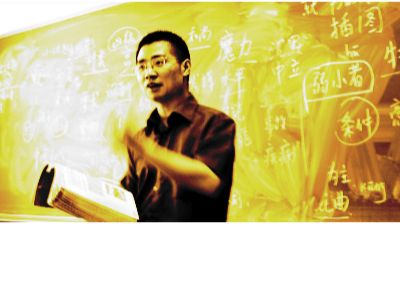The course builds on the lower-level courses, with further study of sentence patterns in everyday spoken Standard Chinese, and expansion of a central vocabulary of words and characters. In addition, an increased number of writing and translation exercises with a larger proportion of written, formal and technical Chinese of various kinds. Facts about China, Chinese culture, society and technical development. The course covers approximately 330 new characters.
LS1496 Chinese B1 for Engineers 7.5 credits

This course requires good basic knowledge of spoken and written everyday Chinese.
If you have prior knowledge from elsewhere, please contact KTH Language and Communication for a compulsory placement test. Contact information can be found on our homepage: www.kth.se/language.
Information per course offering
Choose semester and course offering to see current information and more about the course, such as course syllabus, study period, and application information.
Information for Spring 2026 Start 13 Jan 2026 programme students
- Course location
KTH Campus
- Duration
- 13 Jan 2026 - 1 Jun 2026
- Periods
Spring 2026: P3 (4 hp), P4 (3.5 hp)
- Pace of study
25%
- Application code
60694
- Form of study
Normal Evenings
- Language of instruction
Swedish
- Course memo
- Course memo is not published
- Number of places
20 - 27
- Target group
- Open to all students provided that the course can be included in the program.
- Planned modular schedule
- [object Object]
- Schedule
- Schedule is not published
- Part of programme
- No information inserted
Contact
Course syllabus as PDF
Please note: all information from the Course syllabus is available on this page in an accessible format.
Course syllabus LS1496 (Autumn 2019–)Content and learning outcomes
Course contents
Intended learning outcomes
The intended learning outcomes for the course refer mainly to the level B1 according to CEFR, the Common European Framework of Reference for Languages, and aim to strengthen the student's global competence.
On completion of the course, the student should, in addition to what is specified in courses at lower levels, be able to:
• identify tones and syllables in normal, spoken Standard Chinese
• understand and use everyday and some more formal sentence patterns
• understand and read aloud certain texts of everyday and technical nature
• talk and argue informally about subjects of personal interest or linked to daily life, current events or technology
• account for opinions and plans, retell courses of events and describe impressions and experiences that concern daily life, work-related issues, or technology
• translate texts of everyday and simple technical nature from Chinese into Swedish
Literature and preparations
Specific prerequisites
Basic university qualification. Completion and pass of Chinese A2 for Engineers, equivalent older course, or the equivalent knowledge demonstrated in a compulsory placement test taken before applying for the course.
Literature
Course literature will be announced before the start of the course.
Recommended reference literature and electronic resources will be listed in the course information or in a similar way.
Examination and completion
Grading scale
Examination
- KONA - Assessment, 1.5 credits, grading scale: P, F
- LEXA - Continuous Assessment, 6.0 credits, grading scale: P, F
Based on recommendation from KTH’s coordinator for disabilities, the examiner will decide how to adapt an examination for students with documented disability.
The examiner may apply another examination format when re-examining individual students.
If the course is discontinued, students may request to be examined during the following two academic years.
The examiner determines, in consultation with the KTH coordinator for support to students with disabilities (Funka), possible customized examination for students with any documented and permanent functional disability. The examiner may offer a different type of exam for re-examination of individual students.
Other requirements for final grade
All examination parts passed
75% attendance
Examiner
Ethical approach
- All members of a group are responsible for the group's work.
- In any assessment, every student shall honestly disclose any help received and sources used.
- In an oral assessment, every student shall be able to present and answer questions about the entire assignment and solution.